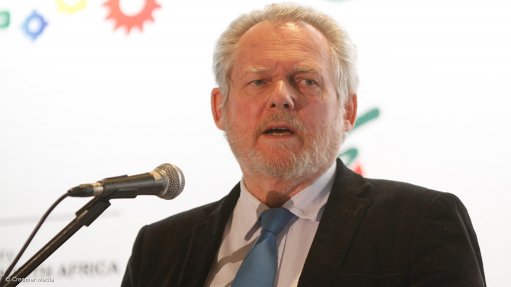
Trade and Industry Minister Dr Rob Davies
Photo by: Duane Daws
Africa’s multibillion-dollar infrastructure deficit is not only severely hampering seamless regional integration, industrialisation and efficiencies, but is also detrimental to the overarching competitiveness of the emerging continent.
It is believed that Africa could be losing in excess of 40% of its competitiveness owing to the absence and inefficiencies of the continent’s infrastructure, which faces a deficit in funding of $93-billion a year over the next 20 years, South African Trade and Industry Minister Dr Rob Davies said on Monday.
“We have a huge amount of catch-up we need to undergo,” he told delegates at this year’s Infrastructure Africa conference, in Sandton, highlighting that infrastructure needs to “link up” Africa’s countries and support higher levels of interregional trade and industrialisation.
The impact of this deficit and subsequent economic erosion has resulted in business activity scaling back some 40% and freight costs in Africa surging 200% above costs in other regions of the world.
“These are issues that erode the competitiveness in Africa,” said Zambia Finance Minister Felix Mutati.
While the infrastructure backlog remained a “daunting task”, there was a need to take a long-term view on the dispatch of infrastructure, with a sense of urgency.
“If we remain captured by business as usual, we are headed for disaster,” he warned delegates.
Mutati said that, in dealing with these issues, there was a need to narrow focus to innovative financing and design, better use of existing infrastructure and the deployment of adequate and appropriate technology.
Davies noted that adequate, effective, affordable and well-maintained infrastructure is an essential countercyclical tool to mitigate the downward trends within Africa’s core economic activity, particularly during the commodity downswing.
“Infrastructure development is a fundamental catalyst for interregional trade and industrialisation,” he reiterated.
Mutati further called for the private sector to join the public sector as partners in the development of infrastructure, which would assist in bridging the deficit.
“We need shared risk with the private sector,” he said, noting that Zambia was contemplating how the risk could be shared and the creation of instruments that generate an appetite for the private sector to invest.
“We need, as government, to define our roles: the things that government can do and those things that we cannot do,” he said, highlighting that government must provide a business environment that created confidence, trust and the opportunity for private sector to invest, while breaking down bureaucracy and reducing regulation, besides others.
Despite the daunting challenges of the infrastructure deficit, working together with the private sector and with regional governments, the infrastructure challenge could be overcome.
“Government must not monopolise investment in infrastructure,” Mutati stressed, pointing to a need to have “ruthless prioritisation” as governments and as Africans.
Davies, however, highlighted the differing views and continuing debate surrounding public–private partnerships (PPPs) and the appropriateness of this model.
“We need to develop further clarity on the question of the participation of the private sector and nature of partnerships that we need to develop with the private sector,” he told delegates, noting the differing views on the model.
Most in favour of PPPs argue that the model delivers funding, quality and efficiencies, while critics argue that it prioritises private commercial interests over public developmental interests.
“I think that we need to work through some of these issues and refine an appropriate way in which the public developmental objectives work together with the private commercial interests in an optimal way to deliver the infrastructure that we need,” Davies concluded.